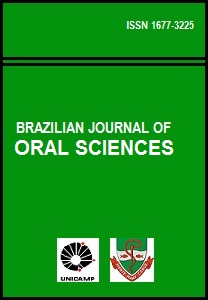Abstract
The aim of this study was to evaluate the antimicrobial activity of different coffee solutions and their effects on the adherence of Streptococcus mutans to glass surface. Coffee solutions were prepared with three commercial products (Pilão, Mellita and Café do Ponto) by two different methods (simple and boiled) (n=15). A control group was also included in the study. For antimicrobial activity testing, tubes containing coffee solution and culture medium were inoculated with a suspension of S. mutans ATCC 35688 and incubated for 1min, 1h, 2h and 4h. Serial dilutions and plating on BHI agar were performed. S. mutans adherence to glass in presence of the different coffee solutions was also tested. The number of adhered bacteria (CFU/mL) was determined by plating method. The results were statistically analyzed by ANOVA and Tukey’s test. The tested coffee solutions did not reduce the number of colony forming units of S. mutans in relation to the control at all evaluation periods. All the solutions reduced significantly the adherence of S. mutans to the glass surface in relation to control. The tested coffee solutions did not present any antimicrobial effect on Streptococcus mutans, however, all the coffee solutions reduced significantly the adherence of S. mutans to the glass surface.References
Hammer KA, Dry L, Johnson M, Michalak EM, Carson CF, Riley TV. Susceptibility of oral bacteria to Melaleuca alternifolia (tea tree) oil in vitro. Oral Microbiol Immunol. 2003; 18: 389-92.
Wu-Yuan CD, Chen CY, Wu RT. Gallotannins inhibit growth, water-insoluble glucan synthesis, and aggregation of mutans streptococci. J Dent Res. 1988; 67: 51-5.
Lee ENC, Vono AZ, Pinheiro CE, Bijella MFTB, Silva SMB. Efeito do mate e do chá, comparado ao do flúor, na prevenção da cárie em ratos. Estomatol Cult. 1986; 16: 17-22.
Elvin-Lewis M, Vitale M, Kopjas J. Anticariogenic potential of commercial teas. J Prev Dent. 1980; 6: 273-84.
Featherstone JDB. The science and practice of caries prevention. J Am Dent Assoc. 2000; 131: 887-99.
Hamilton-Miller JM. Anti-cariogenic properties of tea (Camellia sinensis). J Med Microbiol. 2001; 50: 299-302.
Matsumoto M, Minami T, Sasaki H, Sobue S, Hamada S, Ooshima T. Inhibitory effects of oolong tea extract on caries – inducing properties of mutans streptococci. Caries Res. 1999; 33: 441-5.
Osawa K, Miyazaki K, Shimura S, Okuda J, Matsumoto M, Ooshima T. Identification of cariostatic substances in the cacao bean husk: their anti-glucosyltransferase and antibacterial activities. J Dent Res. 2001; 80: 2000-4.
Matsumoto M, Hamada S, Ooshima T. Molecular analysis of the inhibitory effects of oolong tea polyphenols on glucan binding domain of recombinant glucosyltransferases from Streptococcus mutans MT8148. FEMS Microbiol Lett. 2003; 228: 73-80.
Ooshima T, Osaka Y, Sasaki H, Osawa K, Yasuda H, Matsumura M et al. Caries inhibitory activity of cacao bean husk extract in vitro and animal experiments. Arch Oral Biol. 2000; 45: 639-45.
Paolino VJ, Kashket S, Sparagna CA. Inhibition of dextran synthesis by tannic acid. J Dent Res. 1980; 59: 389.
Stralfors A. Effect on hamster caries by purine derivatives vanillin and some tannin-containing materials. Arch Oral Biol. 1967; 12: 321-32.
Kashket S, Paolino VJ, Lewis DA, van Houte J. Glucosyltransferase inhibition by tannin-like constituents of beverages. J Dent Res 1985; 64: 212.
Kashket S, Paolino VJ, Lewis DA, van Houte J. In vitro inhibition of glucosyltransferase from the dental plaque bacterium Streptococcus mutans by commons beverages and food extracts. Arch Oral Biol. 1985; 30: 821-6.
Otake S, Makimura M, Kuroli T, Nishihara Y, Hirasawa M. Anticaries effects of polyphenolic compounds from japanese green tea. Caries Res. 1991; 25: 438-43.
Toda M, Okubo S, Hiyoshi R, Shimamurat T. The bactericidal activity of tea and coffee. Lett Appl Microbiol. 1989; 8: 123- 5.
Pedro NAR, Badolato MIC, Freitas VPS, Chiarini PFT. Avaliação da qualidade do café torrado e moído processado na região de Campinas, Estado de São Paulo. Rev Inst Adolfo Lutz. 1996; 56: 113-7.
Landucci LF; Oliveira, LD, Brandão EHS, Koga-Ito CY, GaettiJardim E, Jorge AOC. Efeitos de Coffea arabica sobre a aderência de Streptococcus mutans à superfície de vidro. Cienc Odontol Bras. 2003; 6: 58-64.
Daglia M, Tarsi R, Papetti A, Grisoli P, Dacarro C, Pruzzo C et al. Antiadhesive effect of green and roasted coffee on Streptococcus mutans’ adhesive properties on saliva-coated hydroxyapatite beads. J Agric Food Chem. 2002; 50: 1225-9.
Camargo MCR, Toledo MCF. Teor de cafeína em cafés brasileiros. Cienc Tecnol Aliment. 1998; 18: 421-4.
Mello MRPA, Minazzi-Rodrigues RS, Carvalho JB, Shirose I. Estudo comparativo de métodos de extração para determinação de cafeína em café. Rev Inst Adolfo Lutz. 1992; 52: 89-95.
Rasheed A, Haider M. Antibacterial activity of Camellia sinensis extracts against dental caries. Arch Pharm Res. 1998; 21: 348-52.
Sasaki H, Matsumoto M, Tanaka T, Maeda M, Nakai M, Hamada S et al. Antibacterial activity of polyphenol components in oolong tea extract against Streptococcus mutans. Caries Res. 2004; 38: 2-8.
Takarada K, Kimizuka R, Takahashi N, Horima K, Okuda K, Kato T. A comparison of the antibacterial efficacies of essential oils against oral pathogens. Oral Microbiol Immunol. 2004; 19: 61-4.
Wolinsky LE, Sote EO. Isolation of natural plaque-inhibiting substances from “Nigerian chewing sticks”. Caries Res. 1984; 8: 216-25.
The Brazilian Journal of Oral Sciences uses the Creative Commons license (CC), thus preserving the integrity of the articles in an open access environment.


